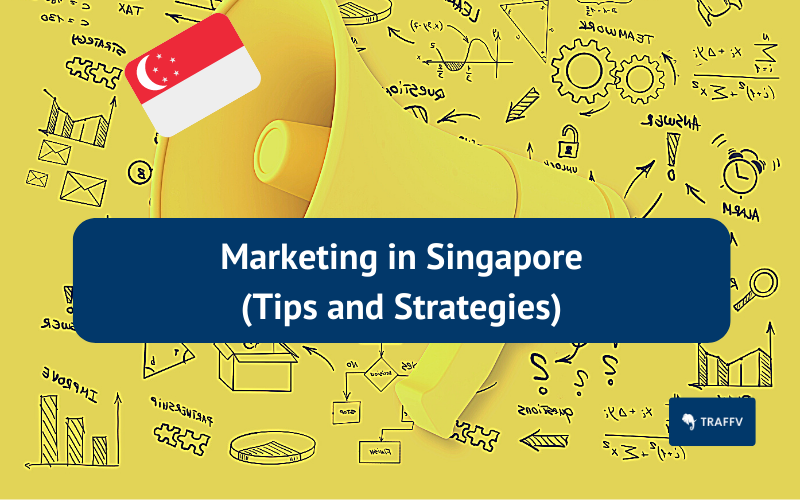Singapore is a technologically advanced country with a lucrative business environment.
This has attracted many international and local companies to launch their operations in Singapore.
With it comes the added competition.
As of February 2022, the Singaporean digital advertising market is valued at 1.16 billion U.S dollars.
The industry saw a 21% year-on-year growth, which means it´s costlier to get in front of consumers.
That’s why you must build an effective strategy to grow your business in Singapore.
We go over everything marketers need to know about building a successful marketing strategy in Singapore.
3 Marketing Tips to Succeed in Singapore
1. Understand your target audience
This is the cornerstone of every successful marketing strategy.
First, define who your business is targeting (your niche).
Ask the question “Who are the people that can benefit from your products/services?”
Be specific with the answer.
For your efforts to be effective, you need to become deeply familiar with your audiences.
Many marketers make the mistake of assuming they understand their target group.
Research instead.
Audience research tips:
- Measure everything:
Make sure you track every interaction between your business and consumers. This includes the business website, social media platforms, and even offline interactions. Integrate the data in one place to build a 360 customer profile. - Conduct market research:
Look at your industry’s latest consumer behavior studies and market trends. You can find Singapore market reports on websites like Statista and Think With Google. You can also gather data using market research tools like Google Trends. - Send customer surveys:
Make this a two-way conversation. Reach out to your existing customers with surveys and questionnaires regarding your products, services, needs, and wishes. Use the insights to inform your consumer marketing strategy.
Ultimately, know that understanding your audience is not a destination, it’s a journey.
Singaporean consumers are people, and people change.
Therefore, it’s essential that marketers conduct continuous customer data analysis and reviews as part of their strategy.
2. Localize your marketing efforts
In a globalized world, localization may be widely regarded as an outdated notion.
But localizing your marketing efforts is crucial to the success of businesses in Singapore and wherever in the world they may be operating.
Building on the previous tip, localization allows your business to better connect with Singapore´s specific consumer base.
In its famous marketing campaigns, HSBC highlights the importance of never underestimating local knowledge, that’s why for many years, it positioned itself as “the world’s local bank.”
The bank emphasizes explicitly how culture can play a significant role in (miss)communicating between parties, especially in a business setting.
Here’s an example of localizing marketing:
Here’s another example:
That’s why marketers should make themselves familiar with Singapore´s consumer base.
Singapore has a highly educated and fully urban population.
Singaporean consumers are technologically advanced and have embraced a digital lifestyle, with 92% of Singapore’s total population being internet users.
Moreover, Singaporean consumers seek better shopping experiences and purchase from brands that can enhance their wellness.
Sources: Think With Google, Digital Report Singapore 2022
3. Build an omnichannel experience
As we saw from the above tip, Singaporean consumers prefer brands that deliver excellent shopping experiences.
Nowadays, marketers cannot build excellent shopping experiences without making them omnichannel experiences.
The customer buying journey includes several touchpoints that transcend devices, digital marketing, and traditional marketing channels.
An omnichannel approach does not see these as isolated interactions.
Instead, it pushes marketers and companies to take all the different online and offline customer touchpoints into account when building your buyer journey.
Singapore Airlines is a great example of a brand offering a superior omnichannel experience.
Besides its presence in the aviation industry, the airline has launched a mobile app and partnered with airports and shopping malls to offer an integrated online and offline experience that meets customers where they are.
One of Singapore Airlines´ initiatives to achieve this is opening its flagship retail store, KrisShop.
Sources: KrisShop
5 Marketing Strategies to Adopt in Singapore
1. Search Engine Optimization
As we see from Google´s 2021 Year in Search report, Singaporeans are adopting a digital-first lifestyle.
This has led to an increase in online consumer searches.
More and more Singaporean savvy consumers are turning online to make well-informed buying decisions; 56% of Singaporeans admit to researching brands online before making a purchase.
Moreover, search engines are the number one brand discovery channel in Singapore, with 34.4% of Singaporeans admitting to having discovered new brands through search.
A search engine optimization strategy allows your business to be where consumers are looking.
Also, understand that SEO is not a direct sales channel as there’s a difference between SEO and SEM.
Instead, SEO efforts compound over time.
An SEO marketing strategy is about businesses creating value for their customers; it’s not about hacking search engine ranking algorithms.
This is something that Google has repeatedly pointed out in their 2022 Google Helpful Content Update.
To create value, your business needs to understand your customer base and buying journey deeply.
Moreover, a successful SEO strategy is more than just optimizing for relevant keywords; it requires technical and local knowledge, as well as time to set up, create content across digital platforms, and track.
For these reasons, many brands choose to outsource this to digital marketing agencies.
Sources: Google, Digital Report Singapore 2022
2. Social Media Marketing
89.5% of the total population in Singapore uses social media platforms on average for 2 hours and 31 minutes daily.
Your target market will surely be among the 5.30 million Singaporean social media users.
A solid social media presence signals legitimacy and trustworthiness.
Moreover, it gives character to your brand – Singaporean consumers want to associate with brands that align with their values and stand for something more than profit.
There are eight major social media platforms in Singapore, which you can see in the table below.
| Social Media | Audience size | Ad reach (% of the total population) |
| 1. YouTube | 5.08 million | 85.8% |
| 2. Facebook | 3.55 million | 60% |
| 3. LinkedIn | 3.20 million | 54.1% |
| 4. Instagram | 3.05 million | 51.5% |
| 5. Twitter | 2.85 million | 48.1% |
| 6. Messenger | 2.05 million | 34.6% |
| 7. TikTok | 1.83 million | 30.08% |
| 8. Snapchat | 995 thousand | 16.8% |
Don’t try to be everywhere at once, as that can be challenging to sustain.
Focus on 1-3 social media channels your target audience uses the most and build your brand there.
For example, Facebook is popular among Millenials and Gen X-ers.
If your target audience belongs to Generation Z, you might want to focus on building a successful TikTok presence rather than on other platforms.
Meanwhile, Boomers prefer to use WhatsApp, so your brand can build a WhatsApp strategy to connect with them.
If you´re a B2B brand targeting other businesses, then LinkedIn might be a better choice for you.
This type of strategy includes both paid and organic marketing efforts.
You can build a loyal following by posting valuable content on the internet and engaging with the community.
Advertising in Singapore can also be an effective lead generation and sales strategy, with 29% of Singaporeans discovering new brands through ads.
Sources: Statista, Digital Report Singapore 2022
3. Influencer Marketing
The popularity and effectiveness of influencer marketing in Singapore have significantly risen since Singaporean consumers have embraced shopping features such as live streaming.
51% of Singaporeans aged 18-24 years old have been persuaded by an influencer digital marketing campaign to make a purchase.
In contrast, only 22% of Singaporeans over 55 make a purchase following an influencer´s recommendation.
This shows that influencer marketing in Singapore is more effective with younger audiences.
It is worth noting that in the past years, Singapore has seen a rise in the popularity of virtual influencer marketing.
Virtual influencers are computer-generated fictional characters with an online following. The majority of people in Singapore admit that virtual influencers do not have any impact on their buying decision.
No matter your marketing budget, you can find an influencer to collaborate with on your next marketing campaigns.
There is a range of nano, micro, and macro influencers.
The first two are significantly less expensive.
Nonetheless, nano and micro-influencers tend to have high engagement rates and loyal followers, so businesses can receive a good deal for money and higher marketing value.
The most important aspect of an influencer marketing campaign is finding the right influencers to collaborate with.
The right influencers are the ones whose audience overlaps with your business audience.
At the same time, those influencer partnerships should be “on brand”, meaning that influencers should share similar values with your brand.
4. Social commerce
Social commerce has been primarily fueled by the rise of social media marketing and influencer marketing in Singapore.
This type of marketing aligns with the need for businesses to build an omnichannel shopping experience as it allows potential customers to move seamlessly between apps and devices.
For example, potential clients first see your brand´s video marketing ad on YouTube.
Later, they may go to search for the brand on social channels.
66.5% of Singaporean consumers use social networks to conduct brand research.
When consumers find the product on one of your socials, such as on Instagram, they should be able to make an instant purchase.
This is only one of the many possible journeys the consumer can make.
Besides shoppable posts, another way digital marketers can implement this strategy is by introducing shoppable ads.
Courts, a leading Singaporean retailer, boosted conversions by 7.8 times and decreased cost per online sales transaction by 84% when it implemented a Smart Shopping Campaign.
This shows how much Singaporean consumers value the convenience of shopping across channels.
Sources: Think With Google, Digital Report Singapore 2022
5. Online Reputation Management
This is an often overlooked strategy, even though by now everyone is aware of the importance of customer reviews and word-of-mouth marketing.
As of 2022, 41% of Singaporeans rely on reviews for their online brand search.
Coming in third place are social networks.
Both reviews and social networks provide social proof to signal that your company is trustworthy and your customers and new visitors can buy from your business without a doubt.
Some businesses may say they cannot control consumer reviews, but you actually can.
We´re not talking about fake reviews.
We´re talking about putting in place a proactive online reputation management strategy.
Unless asked, most consumers will only go online to leave a review after a negative brand experience.
The keyword is “unless asked”.
As an example, an online reputation management strategy might include brand advocacy programs, or it might focus on increasing the number of customer reviews on independent review sites that are trusted by the company’s target audience.
Marketers can implement this strategy via automated email campaigns asking customers for reviews at a “happy moment” during their buyer journey.
This moment can be after customers have received your product and had a chance to try it.
Sources: Digital Report Singapore 2022
Things to Consider when Marketing in Singapore
Marketing in Singapore comes with its own set of challenges.
Singapore is a multi-ethnic society with four official languages: English, Mandarin, Malay, and Tamil.
Therefore, Singapore hosts a mix of cultures.
Consider these aspects when you are defining your target customers and strategy.
Also, remember that culture also plays a significant role in B2B transactions in Singapore
Partnering with a B2B marketing agency can help you navigate the business context in Singapore.
Marketing Industry in Singapore
Businesses in Singapore are spending more than 1.16 billion U.S dollars on digital advertising.
We see a 21% year-on-year growth, with video content showing the most significant growth.
The rise of video marketing comes as no surprise considering the popularity of video networks like YouTube and Facebook.
It shows that Singaporean businesses are capitalizing on the trend of video marketing.
Sources: Digital Report Singapore 2022
How much do brands spend on social media advertising in Singapore?
Out of the overall digital advertising spend in Singapore, social media has the largest spending share.
Consisting of 41% of the total digital ad budget, the Singaporean social media advertising market in 2022 is valued at 473.3 million U.S. dollars.
Sources: Digital Report Singapore 2022
Is the Marketing Industry in Singapore Growing?
In general, we notice that all areas of the marketing industry are growing, especially digital marketing.
Singapore is becoming an increasingly digital country, and brands are taking notice and investing more of their budget into digital marketing.
As of February 2022, we see that all areas of digital advertising in Singapore are growing, specifically:
- Overall advertising industry: +21 year-on-year change; + $199 million U.S. dollars
- Video advertising: +29% year-on-year change; + $31 million U.S. dollars
- Search advertising: +24% year-on-year change; + $73 million U.S. dollars
- Social media advertising: +25% year-on-year change; + $95 million U.S. dollars
- Banner ads: +18% year-on-year change; + $83 million U.S. dollars
- Classifieds: +13% year-on-year change; + $11 million U.S. dollars
Sources: Digital Report Singapore 2022




